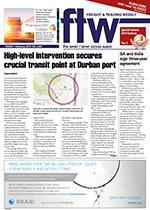Trade with the United States will be affected for months by the political impasse that saw 800 000 federal employees missing two pay checks – even though president Donald Trump backed down over the weekend. According to Nithya Nagarajan and Cortney Morgan, Washingtonbased partners with the law firm Husch Blackwell, the department of commerce and the US international trade commission were effectively shuttered by the standoff over the funding of a wall on the Mexico-US border. The shutdown affected a number of federal agencies that are critical to imports, exports, and international trade, according to the lawyers. Nearly 90% percent of the department of commerce’s staff were affected and were not in their offices during the 35-day shutdown. The International Trade Administration effectively ceased all anti-dumping and countervailing duty investigations (penalties for foreign governments and manufacturers selling/ subsidising goods at less than fair value) as well as other administrative proceedings, including annual administrative reviews, due to the lack of funding. “The delay in ongoing proceedings will have cascading effects on impending deadlines for months to come as all cases are either delayed or postponed for several weeks after the agency reopens,” say the lawyers. South Africa’s exports may be affected by the halting of the commerce department’s Section 232 product exclusion process for tariffs on steel and aluminium. No new exclusions have been granted since December 21, 2018, because DOC did not operate during the shutdown. “We expect to see a significant backlog and further delays when the government reopens, as the Commerce Department has more than 100 000 steel and aluminium exclusion requests to review,” they state. US exports could be affected by the inability of manufacturers to continue importing spares, components and machinery from China under the “Section 301” tariff exemption. Imports valued at around US$34 billion are on the exclusion list, but the process ground to a halt. US importers are also at financial risk as the Automated Commercial Environment (ACE) system was not updated. According to US Customs and Border Protection (CBP), updates to the ACE to reflect tariff exclusions will not be implemented until 10 business days after the shutdown has ended. This means that until the first week of February at the earliest, importers who qualify for exclusions will have to continue paying additional tariffs on affected goods. The latest 301 exclusions have not been updated on ACE. The International Trade Commission (ITC) was also closed, which affected the release of all ITC economic impact reports. Additionally, all HTS (Harmonised Tariff Schedule) classification revisions were not updated. It is not known how long it will take the employees to work through the backlog.
CAPTION
South Africa’s exports may be affected by the halting of the commerce department’s Section 232 product exclusion process for tariffs on steel and aluminium.

